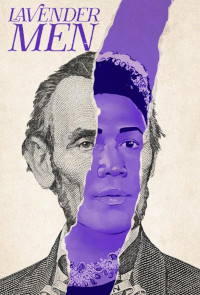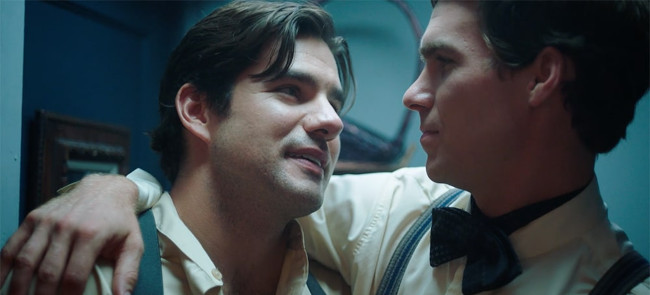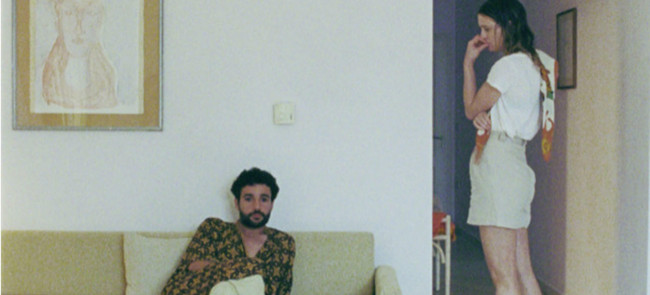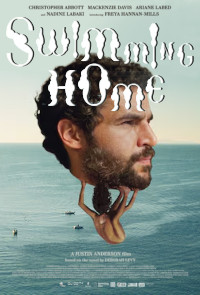| SHADOWS ON THE WALL | REVIEWS | NEWS | FESTIVAL | AWARDS | Q&A | ABOUT | TALKBACK | |||||||||||||||||||||||||||||
 Shadows off the beaten path Shadows off the beaten pathIndies, foreigns, docs and shorts...
On this page:
LAVENDER MEN |
SWIMMING HOME |
TREADING WATER
| |||||||||||||||||||||||||||||
| See also: SHADOWS FILM FESTIVAL | Last update 23.Apr.25 | |||||||||||||||||||||||||||||
|
Lavender Men Review by Rich Cline | 
|  dir Lovell Holder scr Roger Q Mason, Lovell Holder prd Mia Chang, Mia Ellis, Lovell Holder, Roger Q Mason with Roger Q Mason, Pete Ploszek, Alex Esola, Ted Rooney, Philippe Bowgen, Chad Callaghan, Linnea Liu Dakin, Natasha Dewhurst, Mia Ellis, Charlie Thurston, Gillian Williams, Tyler Woehl release US 2.May.25 25/US 1h42 Is it streaming?
|  Snappy and absurd, this meta-style comedy plays out as an imaginary dramatic production that takes a revisionist approach to history. Set inside a theatre, the film is naturally somewhat stagey, with dense dialog and sometimes too-deliberate layers of meaning. So there are times when it feels overworked. But it's sharply well played to bring out provocative ideas and make larger observations, and it's also infused with honest emotions. Stage-managing a comical play about Abraham Lincoln, Taffeta (Mason) is feeling lonely as everyone couples up to go home. So they invents their own fantasia involving lead actor Chris (Esola) and his boyfriend Max (Ploszek). In Taffeta's imagination, they become an officer named Elmer and Senator Abe, with Taffeta playing everyone else. The story plots the working relationship between the two young men as Abe considers running for president. Feelings of romance blossom silently between them, emerging like a reluctant but liberating dance. And both characters begin to worry where their story is heading. Once the messy real-life prologue is out of the way, scenes play out through Taffeta's romanticised view of the world, reclaiming the historical narrative as something that relates to their own experience as a mixed-race queer person. This includes a fabulously glittery interlude in which Taffeta performs as a chandelier. Meanwhile, Taffeta also brings their racial identity into this flight of fancy, linking it to real-world events, including flickering flashbacks that reveal their closeness with the play's director (Bowgen). Mason skilfully balances Taffeta's big personality, with shimmering confidence alongside crippling self-doubt. Even when bullied, they are continually hopeful that something good will happen, and shattered if it doesn't. This makes their yearning unusually sympathetic, even when they're inhabiting other roles. Likeable actors Esola and Ploszek play out the swirling interaction between Elmer and Abe in a naturalistic way that emphasises their friendship and underlying attraction as they face various obstacles. "If you told your whole story, then you might be a great man," Taffeta says to Abe. The film isn't claiming that Lincoln was gay; it's saying that people need to be able to identify with historical figures, and if verified evidence isn't available, the imagination can help. The point is that we all need to be able to connect with other people, and also with our past, in order to plot a path to the future. It's a reminder that in a world where you can be anything, be yourself.
|
| Swimming Home Review by Rich Cline | 
Is it streaming?
|  Set in parched, sun-drenched Greece, this British drama is deliberately disorienting with its artfully offbeat cinematography and characters who struggle to express themselves. Writer-director Justin Anderson takes a quietly observational approach, catching details in ways that feel like furtive glances. This offbeat imagery, including internalised imaginary elements and elements of performance art, is fascinating. Although it's ultimately rather tricky to connect to the story's complex underlying meaning. Arriving at their isolated seaside villa, sulky poet Joe (Abbott) and his journalist wife Isabel (Davis) find a woman named Kitti (Labed) lounging naked in the pool and invite her to stay while she finds her own place. Also on hand are their 15-year-old daughter Nina (Hannan-Mills) and their old friend Laura (Labaki). The presence of this stranger creates a subtle tension in the family's otherwise warm relationships, as Kitti challenges Joe to begin writing again, dredging up issues from his childhood in Bosnia. The lingering question is how Kitti is connected to them. Despite the bright weather and earthy landscapes, the film has a gloomy, sleepy tone that is sometimes almost oppressive. Much of this comes from Joe, who mopes around and sleeps a lot. Thankfully, Abbott brings his magnetic presence even to this role, making Joe intriguing and mostly sympathetic. The central narrative plays out in his internal journey, which is seen in a series of surreal scenes in which he examines how each of these women is linked to him. Imagery is often inverted, and there are extended sequences featuring extreme physicality both in colourful modern dance segments and with people casually naked around water. Davis' Isabel is more forthright than Joe, speaking openly about her feelings and reminding Joe that he needs to figure out what scares him so much. Hannan-Mills has a lovely sense of curiosity as she explores the adult world around her. Labaki remains a bit sidelined. While as the interloper, Labed is enigmatic and enticing, so it's clear why everyone is drawn to her. Striking visuals and a mesmerising tone hold the attention despite the fact that nothing much happens and several sequences feel random. But this inventively reflects the film's central theme about the unreliability of memory, and how powerless we are to control the ways our past haunts us. These underlying ideas are haunting, as is the intense but subtle depiction of how a relationship can be robust and fragile at the same time.
|
| Treading Water Review by Rich Cline | 
|  dir-scr Gino Evans prd Ben Toye with Joe Gill, Becky Bowe, Darren Connolly, Darryl Clark, Jo Dakin, Eliane Hawley, Christine Dalby, Vincent Davies, Leah Salmon, Tahlia Cherry, Thomas Ende, Ben Toye release UK 25.Apr.25 24/UK 2h01  Is it streaming?
|  Thoughtful and introspective, this gritty British drama follows a young man who is battling his dark personal demons. Writer-director Gino Evans gets unusually deep inside this guy, allowing us to see the terrifying things that run through his mind. Shot in Manchester, the film has an earthy, documentary style that's infused with humour and personality. So it's unusually easy for us to identify with the people and situations. After a stint in prison, the obsessive-compulsive Danny (Gill) moves into a halfway house while trying to control his violent thoughts and drug addiction. He thinks he needs heroin to stay sane. His mother (Dalby) can't help, because her husband (Davies) doesn't want a drug user around. Then Danny runs into old classmate Laura (Bowe), who is pregnant and working as a hooker. Danny still wants a relationship with her, but she has her own challenges. Meanwhile, his counsellor Janet (Hawley) encourages him with bold suggestions that will help him take control of his future. This impressively inventive film depicts Danny's scary urges in visceral flurries of imagined brutality. He sees this as a sign that he's a bad person, so we feel his fear that he might do one of these awful things. Janet reminds him that he is aware and in control, and that an active mind is not a bad thing. But his feelings of powerlessness are paralysing. So while he wants to do the work, he can't help but wonder if anything will ever be better for him. Gill plays Danny with such openhanded honesty that he's almost startlingly likeable. He may be making some dodgy decisions, but his heart is in the right place. He's also observant and smart enough to know that he needs help. This makes his conversations with the superb Bowe's more guarded Laura fascinating. Laura is a tenacious woman in a very difficult situation. The connection they build is hopeful and complex, so each setback they experience is painful to watch. The film's pace wanes as it spirals through various set-pieces and distinct plot points, so we feel the overlong running time. But each scene is so sharply well shot and played that it carries a kick. And in the end, this is a wonderful reminder that each person has a story that is virtually impossible for us to understand, no matter what all the evidence tells us. It's an unusually sensitive look at some very hard themes.
| 
See also: SHADOWS FILM FESTIVAL © 2025 by Rich Cline, Shadows
on the Wall
HOME | REVIEWS | NEWS | FESTIVAL | AWARDS
| Q&A | ABOUT | TALKBACK | | ||||||||||||||||||


